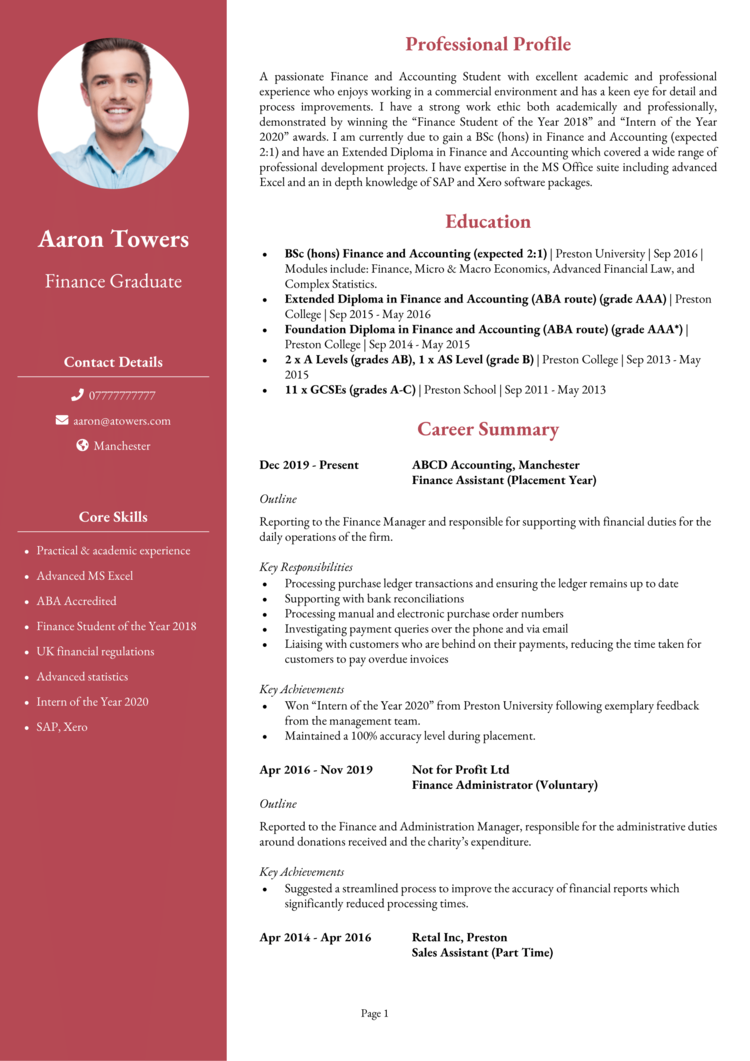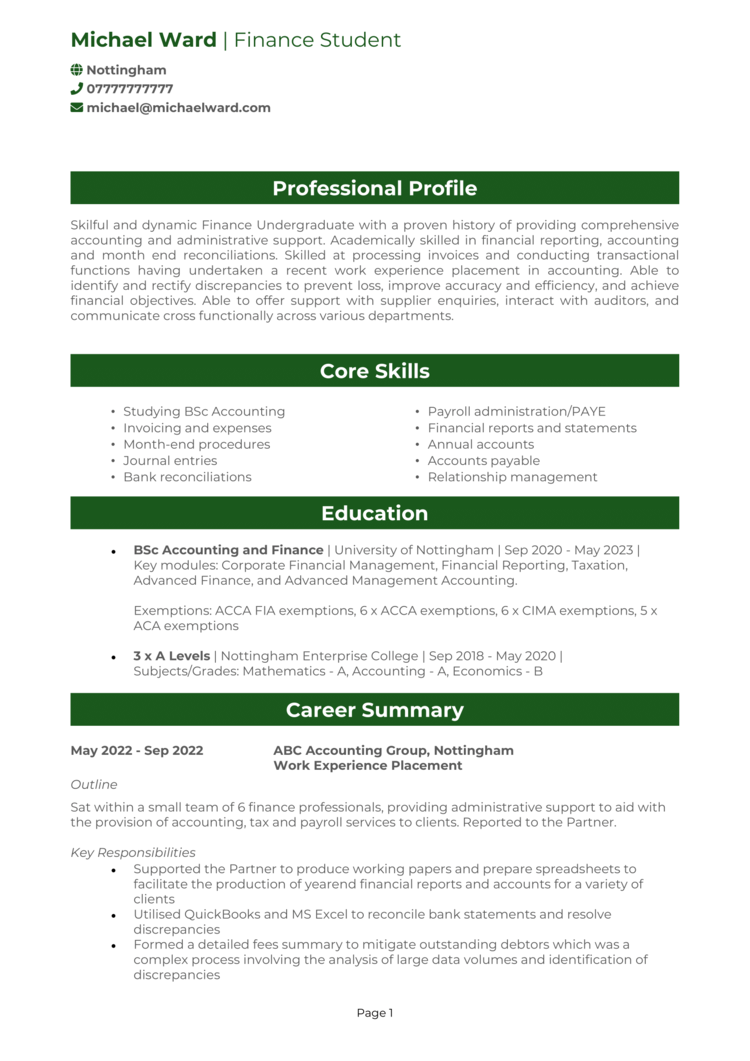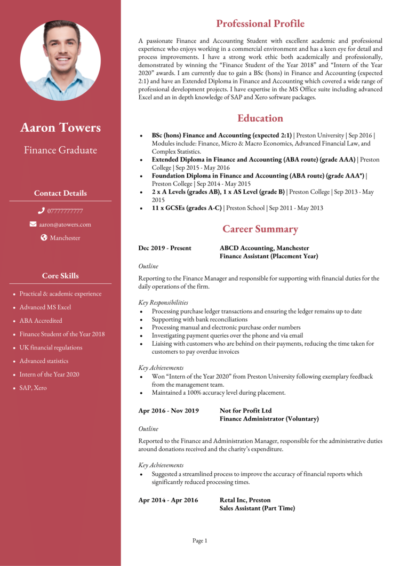Your degree proves you know your assets from your liabilities, but your CV needs to show employers you can apply that knowledge in the real world.
Employers aren’t expecting decades of experience: they want to see that you’re ready to apply your knowledge and contribute to their team.
This guide and its 2 Finance Graduate CV examples will walk you through creating an application which demonstrates your potential and helps you stand out in a competitive job market.
Finance Graduate CV example

Finance Student CV example

How to write your Finance Graduate CV
Discover how to create a quality Finance Graduate CV with this simple step-by-step guide.
Starting out in finance means proving you’ve got the knowledge, analytical thinking, and drive to succeed. Your CV needs to show off your education and transferable skills while keeping things professional and easy to follow.
This guide will help with writing a CV one section at a time, from highlighting your degree and coursework to demonstrating relevant projects, internships, and the essential skills that make you a strong candidate.
The best way to structure your Finance Graduate CV


As a graduate entering the finance industry, your CV should focus on the qualifications, projects, and internships that show your potential. You know financial reports are only valuable if they’re easy to follow – your CV works the same way: a logical and clear structure ensures hiring managers can quickly find what they need.
Here’s the layout your CV should follow:
- Name and contact details – Display your personal details clearly at the top so employers can get in touch easily. Including a photo is entirely optional.
- Profile – Begin with a concise summary that highlights your expertise and what you bring to the role.
- Core skills – Highlight your most relevant abilities, such as financial analysis, reporting, and data interpretation.
- Work experience – Include internships, placements, or part-time jobs, focusing on relevant finance-related tasks.
- Education – As a recent graduate, this section will be a key focus, listing your degree, coursework, and academic achievements.
- Additional info – Add any additional details, like awards, professional memberships, or hobbies that highlight your skills or personality.
How should you format a Finance Graduate CV?


A clean and professional layout helps your CV make a strong first impression. Finance is all about attention to detail, so your CV should reflect that with clear formatting and consistent styling. If your format is confusing or inconsistent, recruiters will assume your analysis might be too, so keep visual mistakes to a minimum.
Keep these formatting tips in mind:
- Bullet points – Use short, sharp bullet points to present your responsibilities and achievements clearly.
- Divide sections – Make use of distinct headings and logical spacing to guide recruiters through your CV.
- Use a clear and readable font – A simple, professional font ensures readability while keeping the layout polished and tidy.
- No more than 2 pages – This gives you the length to detail your experience while keeping it concise enough to respect the recruiter’s time.
The best way to write a Finance Graduate CV profile


Your professional profile is a chance to introduce yourself to employers and explain why you’re a strong candidate, even with limited professional experience. This isn’t the place for vague waffle – get straight to your strengths like a headline financial summary. Show recruiters how and why hiring you would make a positive impact on their firm.
As a junior candidate, you should consider a longer, more comprehensive personal statement, and attach a cover letter to your CV which goes into greater depth.
Finance Graduate CV profile examples
Profile 1
Ambitious Finance Graduate with a strong foundation in financial analysis, investment strategies, and risk management. Skilled in data analysis, financial modelling, and budget forecasting. Proficient in Excel, Bloomberg Terminal, and financial reporting tools. Passionate about applying financial principles to drive business growth and informed decision-making.
Profile 2
Detail-oriented Finance Graduate with hands-on experience in financial planning, corporate finance, and market research through internships. Adept at analysing financial statements, conducting investment evaluations, and preparing reports. Proficient in using Power BI, QuickBooks, and SAP for financial analysis. Committed to developing innovative solutions to improve financial efficiency.
Things to have in your Finance Graduate CV profile
Here’s what to include:
- Academic background – Mention your finance-related degree and any standout coursework.
- Key finance skills – Highlight analytical thinking, data interpretation, and financial reporting.
- Relevant experience – Refer briefly to internships, university projects, or research that developed your skills.
- Career goals – Explain your ambition to build a career in finance and contribute to a company’s success.
- Technical knowledge – If you have proficiency in software like Excel, QuickBooks, or financial modelling tools, mention it here.
How to present your core skills section properly


As a finance graduate, skills for your CV should highlight the technical and analytical abilities developed during your studies, alongside any professional competencies gained through internships or part-time roles. Tailor this list to match the specific role you’re applying for, using the job description as a guide.
Since this section is a quick overview, focus on the abilities most valued in entry-level finance roles – such as financial analysis, data interpretation, and proficiency in financial software. You can also emphasise transferable skills like problem-solving and attention to detail.
Key skills that make a Finance Graduate CV stand out
- Financial Analysis and Reporting – Interpreting financial data, preparing reports, and providing insights on company performance.
- Budgeting and Forecasting – Assisting in financial planning by analysing revenue and expense trends to predict future performance.
- Accounting Principles and Financial Statements – Understanding balance sheets, income statements, and cash flow reports.
- Investment and Risk Management – Analysing financial markets, assessing risks, and exploring investment opportunities.
- Cost Analysis and Control – Identifying inefficiencies and recommending cost-saving measures to improve profitability.
- Taxation and Compliance – Gaining knowledge of tax regulations and assisting with VAT, corporate tax, and financial compliance.
- Excel and Financial Modelling – Using advanced Excel functions and tools like Bloomberg or SAP to analyse and present data.
- Audit Support and Internal Controls – Assisting with audits, ensuring accuracy in financial records, and maintaining compliance.
- Business and Market Analysis – Researching industry trends, competitor performance, and economic indicators to guide financial decisions.
- Communication and Stakeholder Engagement – Presenting financial insights and working with teams across finance, accounting, and operations.
Presenting your education history


For a graduate CV, this section is a major focus. Employers will want to see not only your degree but also any standout coursework, research projects, or academic achievements that prove your knowledge and work ethic.
Include your degree title, university name, and dates, along with a few bullet points highlighting relevant modules, high grades, or dissertation topics if they’re relevant to the role.
If you’ve taken part in finance competitions, case studies, or extra training, mention these as well in your education section.
Example education sections
Education 1
First Class BSc (Hons) Finance & Investment | University of Warwick | 2020–2023
Modules included Corporate Finance, Financial Modelling, and Investment Analysis. Completed a dissertation on the impact of fintech innovations on global financial markets, achieving a distinction. Undertook a summer internship at a private equity firm, assisting in financial due diligence and valuation analysis.
3x A-Levels (A-B) | Nottingham Sixth Form College | 2018–2020
10x GCSEs (A*-C) | Nottingham Academy | 2016–2018
Education 2
Upper Second Class BSc (Hons) Accounting & Finance | University of Manchester | 2019–2022
Modules included Risk Management, Financial Reporting, and Econometrics. Led a group project on corporate tax strategies, presenting findings to industry professionals. Completed a placement year at a multinational investment bank, assisting with financial modelling and performance analysis.
BTEC Level 3 Extended Diploma in Business (D*DD) | Leeds City College | 2017–2019
9x GCSEs (A*-C) | Leeds High School | 2015–2017
What to include in your education section
For each qualification, add the following info:
- Qualification & organisation – Give the name of the certification and the institution where you earned it.
- Dates studied – Just state the start and finish month and year, or the expected finish if you’re still studying.
- Extra details – If you worked on a module which was particularly relevant to the role you’re applying for, add a little more detail on specific projects to showcase your specialised knowledge.
Best qualifications for a Finance Graduate
- BSc/BA in Finance, Accounting, or Economics – The most common and directly relevant degree.
- MSc in Finance (if applicable) – For graduates with a postgraduate degree.
- Investment Foundations Certificate (CFA Institute) – Great for entry-level finance knowledge.
- Excel and Financial Modelling Certification – Shows technical proficiency highly valued in finance.AAT (Association of Accounting Technicians) Foundation – Particularly helpful for roles combining finance and accounting.
How to present your work experience in your CV


As a graduate, your work experience might be limited, but that doesn’t mean you have nothing to show. Every bit of real-world experience counts – even part-time jobs and internships can show relevant skills.
If you have no work experience in finance, focus on transferable skills like communication, teamwork, and time management. The key is to demonstrate how your previous roles have helped prepare you for a finance career.
List these in reverse chronological order and provide enough context to show how each experience contributes to your employability.
How should you list jobs on your Finance Graduate CV?

- Outline – Give a brief overview of the organisation you worked for and the type of work you were involved in.
- Responsibilities – Describe the tasks you handled, especially those involving analysis, data management, or reporting. Use action words like “assisted,” “analysed,” and “prepared.”
- Achievements – Highlight how you added value, such as improving processes, delivering reports, or developing key skills during your time there.
Work history examples for Finance Graduates
Finance Intern | Fairweather Capital
Outline
Within the finance department of a private equity firm, assisted in financial modelling, portfolio analysis, and investment research.
Responsibilities
- Conducted market research to identify potential investment opportunities and risks.
- Prepared financial models and valuation reports to support investment decisions.
- Analysed financial statements to assess company performance and profitability.
- Assisted in preparing reports for stakeholders and investors.
- Worked with senior analysts to evaluate portfolio performance and make strategic recommendations.
Achievements
- Helped identify an undervalued investment opportunity, contributing to a successful acquisition.
- Improved financial model accuracy by 15 percent through data refinement and analysis.
- Recognised for delivering high-quality reports that enhanced investment decision-making.
Finance Assistant (Placement) | BBM Corporate Solutions
Outline
For a multinational business consultancy, provided financial reporting and budget analysis support to senior finance teams.
Responsibilities
- Assisted in preparing financial statements, ensuring compliance with accounting standards.
- Monitored budget allocations, highlighting variances and potential cost-saving opportunities.
- Compiled and analysed financial data to support business planning and decision-making.
- Processed invoices and payments, ensuring accuracy and timely transactions.
- Liaised with different departments to ensure alignment of financial processes and reporting.
Achievements
- Helped reduce operational expenses by identifying cost-cutting opportunities.
- Improved accuracy of financial reporting by refining data collection methods.
- Recognised for strong analytical skills and attention to detail in budget forecasting.
Additional info


As a junior candidate, you’d benefit from taking the time to outline some extra details that could enhance your application.
Anything from hobbies and programming language skills might come in handy for a finance graduate, so make a note of anything that could emphasise your fit for the role.
Good additional info for Finance Graduates
- Hobbies – Activities that demonstrate analytical thinking, problem-solving, or strategic decision-making—such as investing, chess, or data analysis—can be particularly relevant.
- Awards and Achievements – Academic recognitions, stock market competitions, or leadership awards showcase dedication and quantitative skills.
- Extracurricular Activities – Participation in finance societies, investment clubs, or leadership roles highlights initiative, teamwork, and industry engagement.
- Personal Projects – Any independent finance-related research, trading experience, or self-study in financial modelling can demonstrate a strong passion for the field.
Additional info example
Additional info
Hobbies
Stock market analysis – Independently researching investment trends and tracking market movements using financial news sources.
Chess – Competing in local tournaments, developing strategic thinking, patience, and problem-solving abilities.
Personal budgeting – Created an Excel-based financial tracking system to manage expenses and savings effectively.
Awards and Achievements
Top 5% in university finance module – Recognised for exceptional analytical skills and financial modelling proficiency.
University trading competition finalist – Successfully managed a simulated investment portfolio, achieving a high return on investment.
Extracurricular Activities
Finance Society member – Attended workshops on corporate finance, investment banking, and fintech innovations.
Business case competition – Worked in a team to develop financial strategies for a startup, presenting to industry professionals.
Personal Projects
Stock portfolio management – Built and tracked a personal investment portfolio, applying knowledge of risk management and market analysis.
Financial blog – Published articles on personal finance and investment strategies, developing research and communication skills.





